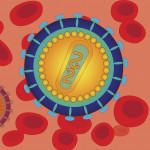The first clinical trial participant has been treated with an experimental CAR-T cell therapy, a “living drug” that could potentially lead to long-term remission. Anti-retroviral therapy can keep HIV suppressed as long as treatment continues, but the virus establishes a long--lasting reservoir that makes a cure elusive. Best known as a cancer treatment, chimeric antigen receptor T-cell therapy reprograms an individual’s T cells to make them work better. The anti-HIV duoCAR-T is modified with receptors that recognize HIV-infected cells expressing the viral gp120 envelope protein. Preclinical studies showed that the CAR-T cells can travel to the spleen—a major viral reservoir site—and eliminate HIV-infected immune cells in mice. The trial is recruiting adults on antiretroviral therapy who have had an undetectable viral load for at least a year. They will receive a low or high dose of anti-HIV duoCAR-T with or without chemotherapy and will then try an antiretroviral treatment interruption. The first participant, who was treated in mid-August, is reported to be doing fine.

iStock (Model(s) used for illustrative purposes only)
Cure: CAR-T for Cure
A trial is recruiting adults on antiretroviral therapy who have had an undetectable viral load for at least a year.






Comments
Comments